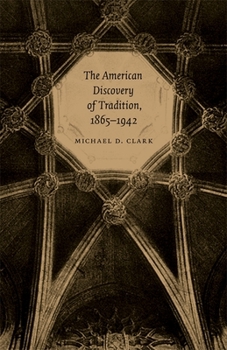The American Discovery of Tradition, 1865-1942
Between the American Revolution and the Civil War many Americans professed to reject altogether the notion of adhering to tradition, perceiving it as a malign European influence. But by the beginning of the twentieth century, Americans had possibly become more tradition-minded than their European contemporaries. So argues Michael D. Clark in this incisive work of social and intellectual history. Challenging reigning assumptions, Clark maintains that in the period 1865 to 1942 Americans became more conscious of tradition as a social force, viewed it more positively, and used it more eclectically and selectively for personal and social enrichment. Clark expands upon the existing body of scholarly work by clearly distinguishing tradition from other ways of relating to the past and by studying particular traditions that shaped American thought and culture. He gives primary attention to five individuals who represent the growing influence of tradition in this period: the popular philosopher and historian John Fiske, representing Anglo-American tradition; the Virginia historians Philip Bruce and Lyon G. Tyler, representing a southern variation on a national tradition; the country's leading neo-Gothic architect, Ralph Adams Cram, representing a surprisingly pervasive medieval tradition; and the sociologist Charles H. Cooley, representing views on immigrant traditions. Clark examines how the idea of tradition, initially associated with family home and local town, was carried outward to the larger sphere and applied to promote American expansionism -- territorially, economically, and demographically. Tradition was also used as a weapon by well-entrenched social groups in struggles over power and values. It offered a sense of stability in a time of unsettling technological and sociological change. Ironically, Clark shows, 'traditionalists of this era helped to create a modern sensibility by opposing the Victorian linear sense of history and employing instead historical cycles and typology as ways to bridge past and present. The American Discovery of Tradition, 1865--1942 describes a period of time when the social and intellectual forces of tradition and modernity converged in the United States. America was both a nation looking back, now having a memory of its own past, and a nation looking forward to future progress. Clark's book reveals the shaping of the modern American self and its distinctive attitude -- both positive and negative -- toward tradition.
Format:Hardcover
Language:English
ISBN:0807130419
ISBN13:9780807130414
Release Date:March 2005
Publisher:LSU Press
Length:268 Pages
Weight:1.09 lbs.
Dimensions:1.0" x 5.8" x 8.8"
Customer Reviews
0 rating





